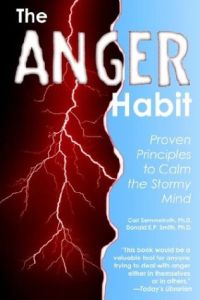Join getAbstract to access the summary!

Join getAbstract to access the summary!
Carl Semelroth and Donald E. P. Smith
The Anger Habit
Proven Principles to Calm the Stormy Mind
Sourcebooks, 2000
What's inside?
To avoid self-defeating outbursts and kick the anger habit, substitute reason for rage.
Recommendation
This short book offers a solution to a difficult and dangerous problem: habitual, uncontrollable anger. Such anger, explain authors Carl Semmelroth and Donald E. P. Smith, is a bad habit, and other habits may trigger it. Just as smokers get the urge for a cigarette at certain times, such as after a meal, while having a drink or while socializing, angry people assert their anger according to repetitive patterns. They may explode, for example, in response to inconsiderate drivers, disobedient children or perceived slights from employers. They stoke their tantrums with feelings of frustration and negative interpretations of the conduct of others. They fantasize frequently about how they will get control over those they see as their antagonists. Semmelroth and Smith do not tell anger addicts to temper their outbursts. Instead, they believe angry people must break the habit altogether, by replacing rage with reason and trying to understand the deeper side of their own feelings. Although this idea has merit, the authors offer their prescription with, perhaps, less than fair warning of just how difficult it is to change habits as deeply rooted as those that nourish anger. With this caution, getAbstract.com suggests that people whose rages have become uncontrollable – or those who have to work or live with them – may benefit greatly from the ideas in this book.
Summary
About the Authors
Carl Semmelroth, Ph.D., has been a mental health practitioner in Michigan for more than 25 years. Donald E. P. Smith, Ph.D., is emeritus professor of educational psychology at the University of Michigan. He is the author of six books and numerous journal articles.

















Comment on this summary